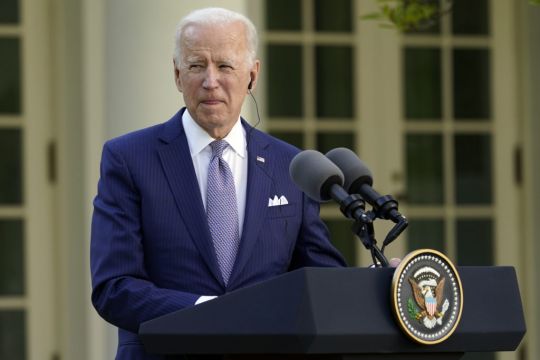US President Joe Biden will embark on his first overseas trip in office in June, the White House has announced.
Mr Biden will visit both England and Brussels for a series of high-level international summits.
However, there are currently no plans for the president to visit Ireland, as reported in The Irish Times.
Asked if a visit to Ireland would form part of the trip, White House press secretary Jen Psaki said on Friday: “There’s not currently a planned Ireland stop.”
However, she said additional stops to the trip could be announced in due course.
“I announced the confirmed parts of his trip, at this point of time I don’t have any additional stops to add,” she said.
Taoiseach Micheál Martin invited Mr Biden to visit Ireland in his first conversation with him after his election victory last November. Mr Biden, who speaks often of his Irish-American heritage, last visited in 2016 in the final year of his vice-presidency.
Key allies
Mr Biden's first international trip as US President comes with the aim of demonstrating his administration’s commitment to the transatlantic alliance and re-engagement with key allies.
Mr Biden will attend the Group of Seven summit in Cornwall, England, set for June 11th to 13th, followed by a visit to Brussels, where he will hold meetings with the European Union leadership and attend the June 14th summit of leaders of the North Atlantic Treaty Organisation (Nato).
The meetings with the United States’ closest allies come as Mr Biden has invited Russian President Vladimir Putin to a summit in the coming months in a third country, though no date has yet been set.
Most recent American presidents have selected North American neighbours for their first cross-border trips, though former president Donald Trump, whose penchant for unilateral action and open scepticism of the Nato alliance unsettled American allies, made his first overseas stop in Riyadh, Saudi Arabia.
It’s an illustration of something that the president has been clear about, that the transatlantic alliance is back
“It’s both a practical chance to connect with key allies and partners on shared opportunities and challenges,” said Yohannes Abraham, the chief of staff and executive secretary of the National Security Council, in an interview with the AP.
“But also it’s an illustration of something that the president has been clear about, that the transatlantic alliance is back, that revitalising it is a key priority of his, and that the transatlantic relationship is a strong foundation on which our collective security and shared prosperity are built.”
Mr Biden, for his part, held “virtual bilateral” meetings with the leaders of Canada and Mexico in February and March respectively.
In-person meetings
The June trip will follow after Mr Biden’s first in-person bilateral meetings with Japanese Prime Minister Yoshihide Suga at the White House last week and next month’s planned visit by President Moon Jae-in of South Korea.
In Cornwall, Mr Biden will hold bilateral meetings with British Prime Minister Boris Johnson and other leaders.
He will hold additional one-on-one meetings in Brussels with Nato allies, said White House press secretary Jen Psaki.
“This trip will highlight his commitment to restoring our alliances, revitalising the transatlantic relationship, and working in close co-operation with our allies and multilateral partners to address global challenges and better secure America’s interests,” she said in a statement.

The announcement comes shortly after the conclusion of Mr Biden’s two-day virtual climate summit, in which he received praise from leaders, particularly those in Europe, for returning the US to the Paris Climate Agreement and re-engaging on a host of other issues of shared concern.
The trip will mark the most ambitious travel schedule yet for Mr Biden since the onset of the coronavirus pandemic, as the president has sought to model safe behaviour for the nation.
It comes as the US has stepped up its travel warnings for much of the world due to the virus.
Both the UK and Belgium are listed by the State Department under level four, the highest, “do not travel” advisory, and are the subject of specific prohibitions preventing most travel to the US by non-citizens.
“There’s going to be components of this trip that probably look and feel different than they did in the past because we are taking the health of all involved very seriously as we plan this,” said Mr Abraham.
The Centres for Disease Control and Prevention last month lifted quarantine guidance for international travel for those fully vaccinated for Covid-19, but still recommends that vaccinated individuals returning from overseas monitor their symptoms and take a test three to five days after returning to the US.







